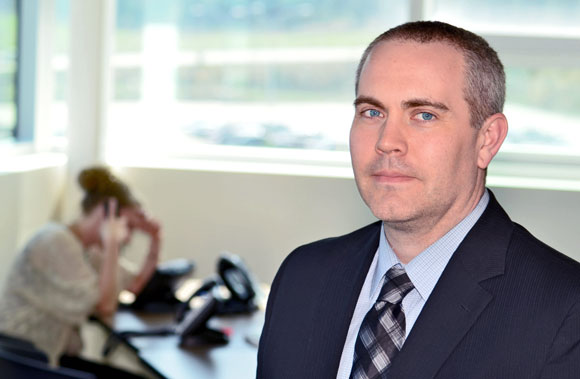
UBC researcher David Walker
UBC study looks at what happens when customers snap at call centre workers
Many of us have done it: we use the kind of language and tone with a call centre agent that could easily be considered rude. And to every action, there is a reaction.
UBC researcher David Walker is investigating how call centre employees react to impolite customers, and how those customers in turn affect customer service quality.
“Statistics Canada reports that 13.2 million Canadians work in customer service,” says Walker, who collected data from more than 400 call centre service interactions to support this research project.
“From other studies we know many service employees report dealing with frustrated customers. Customers think a rude or condescending comment has no effect on the employee. But what my research shows is that employees respond to customer rudeness with similar uncivil behaviour. These responses can significantly reduce service quality.”
Walker, from the Faculty of Management on UBC’s Okanagan campus, and his collaborators, Danielle van Jaarsveld and Daniel Skarlicki, who are from the Sauder School of Business at UBC’s Vancouver campus, recently published a paper on this work in the Journal of Applied Psychology.
“One of our key findings was that employee expectations played a significant role in service interactions,” notes Walker. “Employees who had the strongest uncivil response to rude customers tended to expect positive service interactions. On the other hand, employees expecting unpleasant conversations were less likely to mirror customer rudeness with their own rude behaviour.”
Employees’ personalities also matter. Pessimistic people who expected positive interactions were the most likely to react and be rude to a rude customer.
Walker’s data suggest what the customer does, employees expectations and employee personality all matter. Understanding this combination can help managers predict which employees might be better suited for customer service positions, especially those positions with especially demanding customers.
Walker is now immersed in the next phase of his research – dissecting 50 hours of call centre audio to see if certain customer comments trigger employee incivility.
“We’re looking to examine what are known as incivility spirals – a sequence of rude comments between customers and employees,” explains Walker. “We want to know if, when, and why incivility can go from one person to another and how it carries on or stops during the call.” Walker’s hunch is that it takes more than a customer demonstrating anger to trigger an uncivil employee response, potentially leading to an incivility spiral.
“We think customers might have to attack the employee’s identity or question his or her ability to do the job for the employee to respond negatively,” he notes.
“Identifying what causes the problem is just the first step. It’s important to figure out what employees are doing correctly in those situations where they are successful in handling rude customers. We would like to help managers support employees in dealing with uncivil customers, ultimately resulting in a better service quality, which is good for business.”
Walker adds that as customers, “we should think a little more about what we say to service employees. If you choose to belittle an employee, you do so at your peril. If we get bad service, we might have had something to do with it.”
A link to Walker’s study citation and abstract can be found here: http://psycnet.apa.org/journals/apl/99/1/151/
—30—